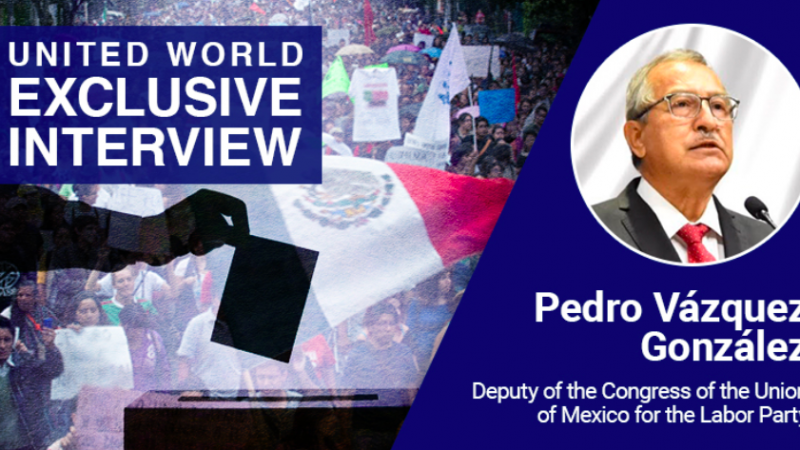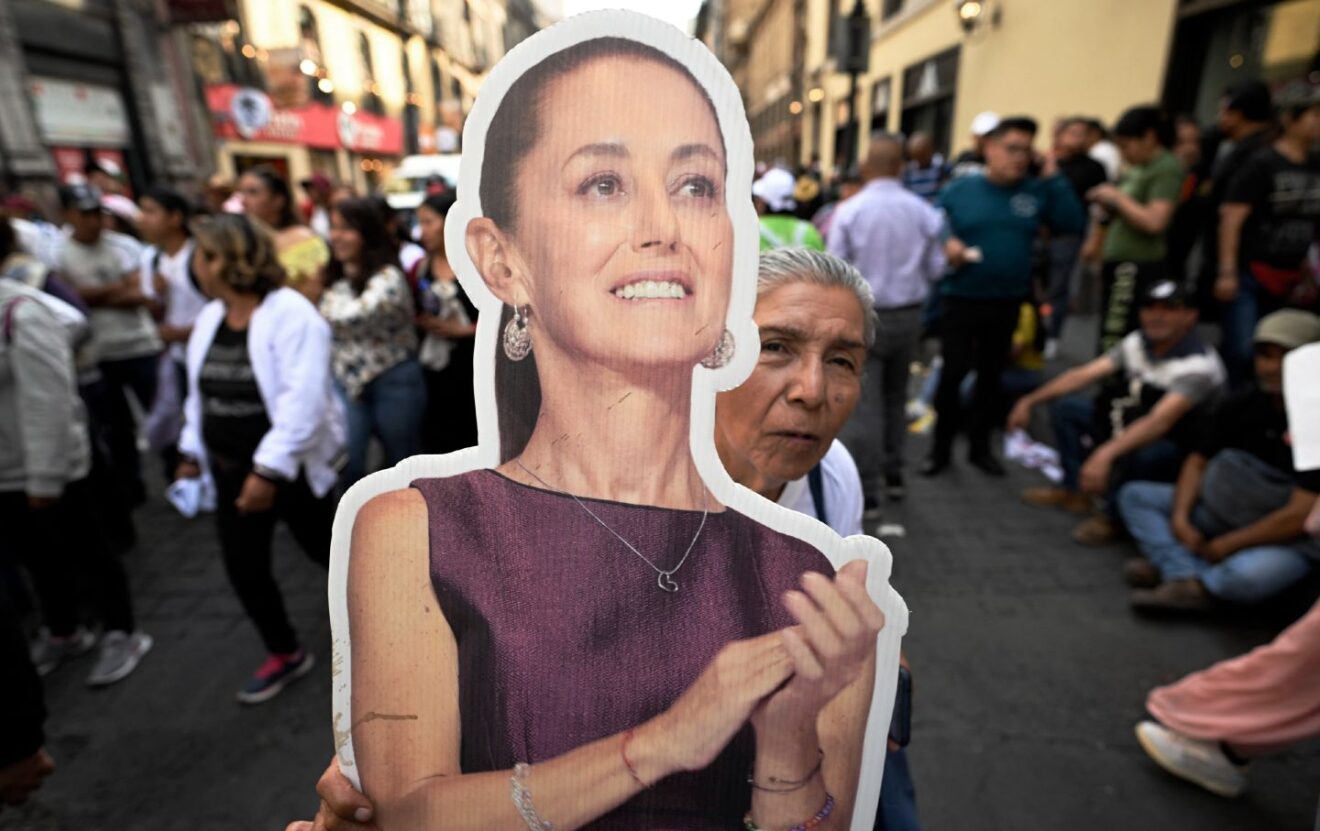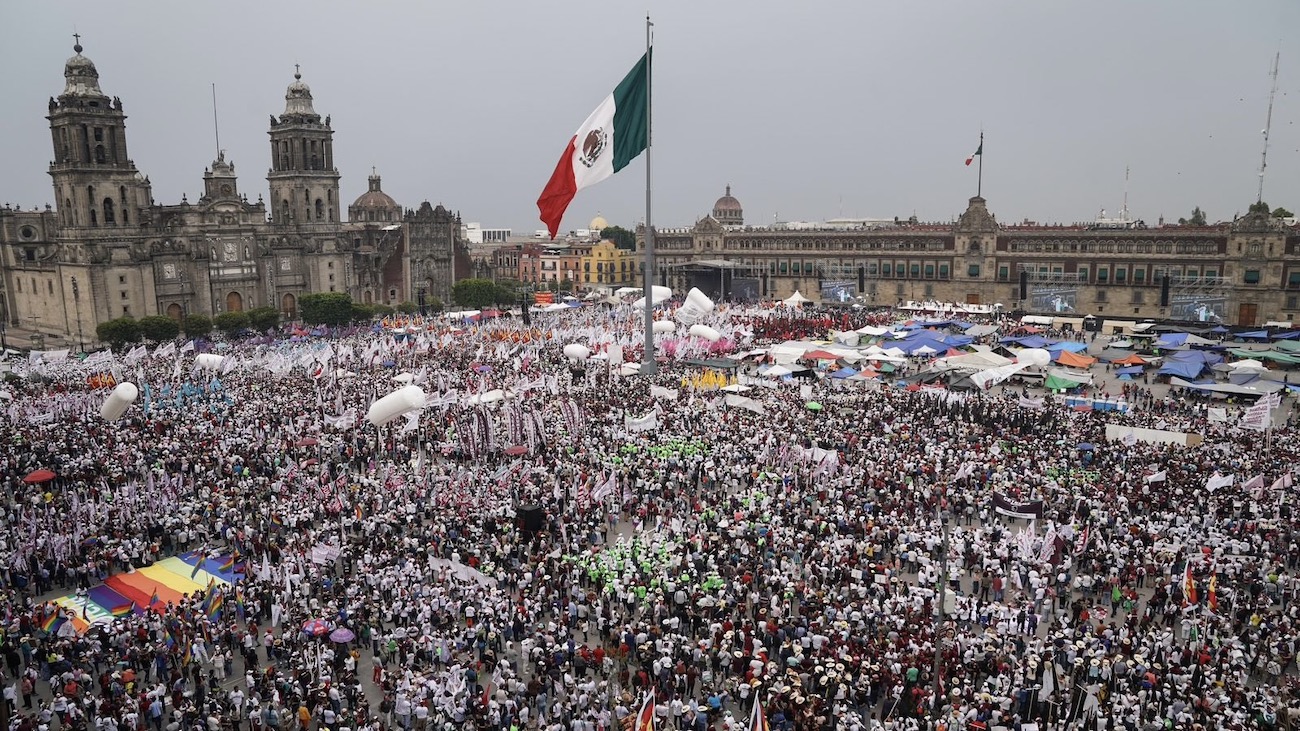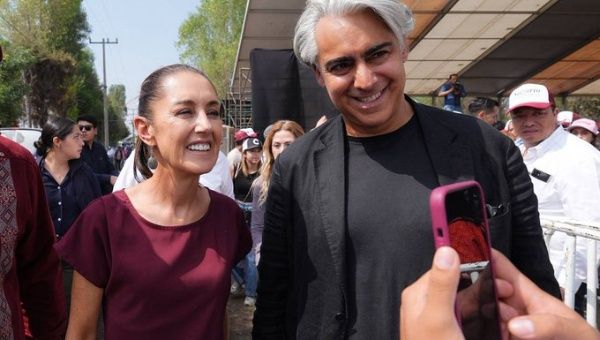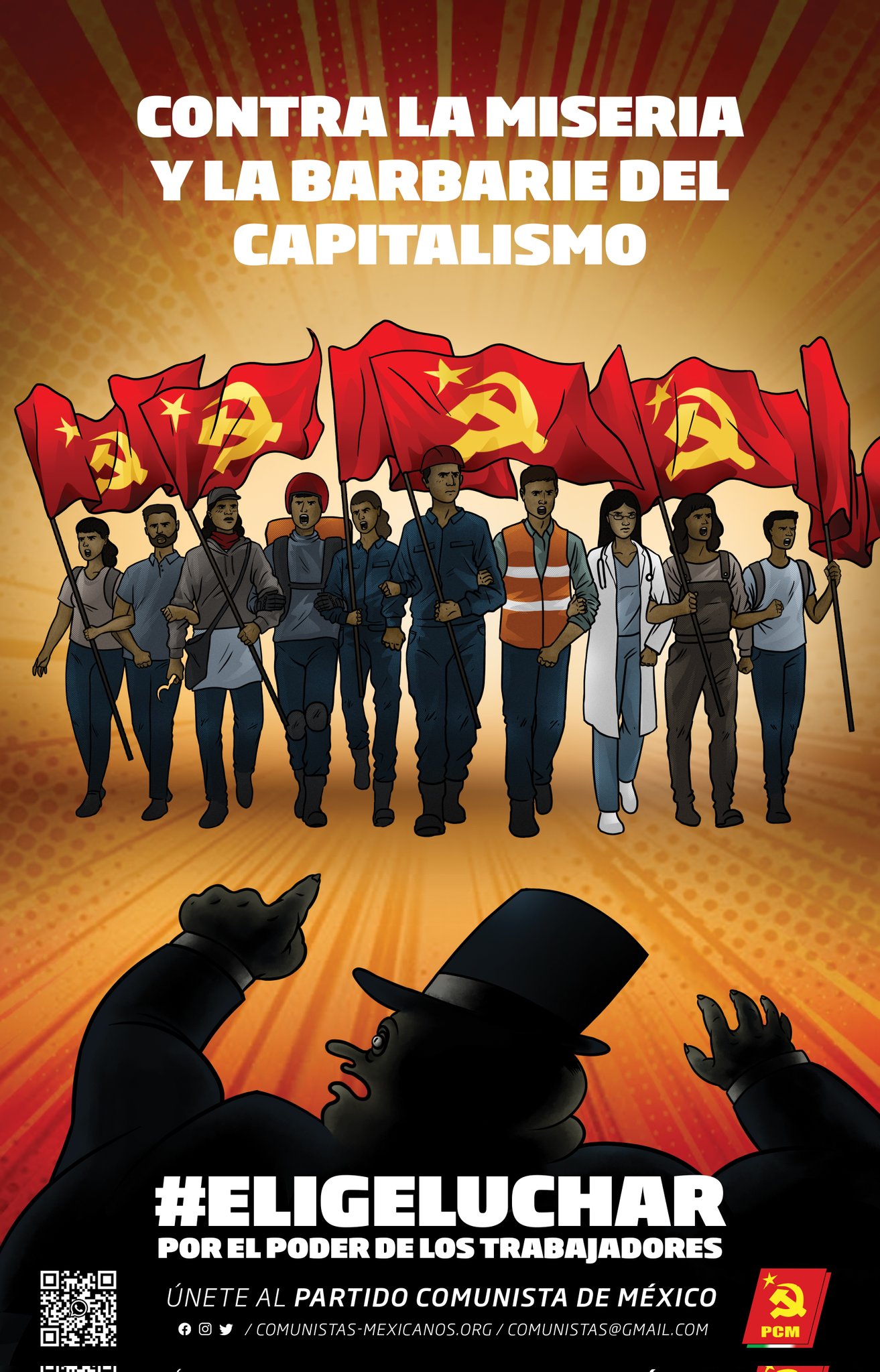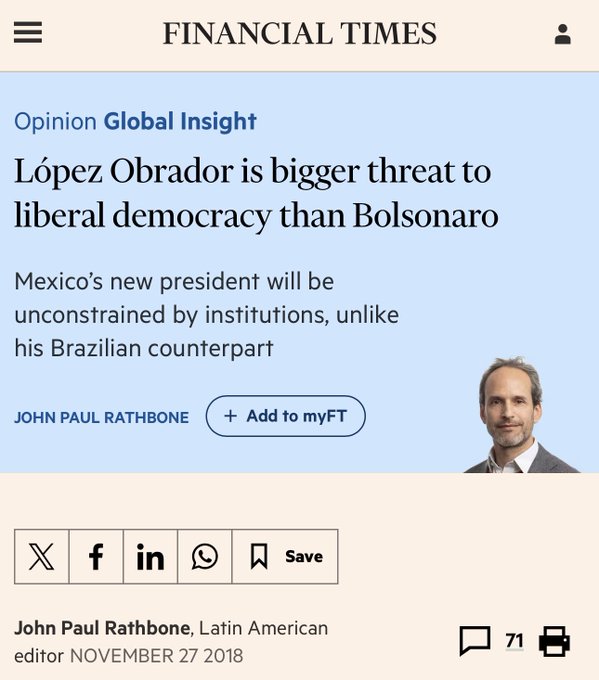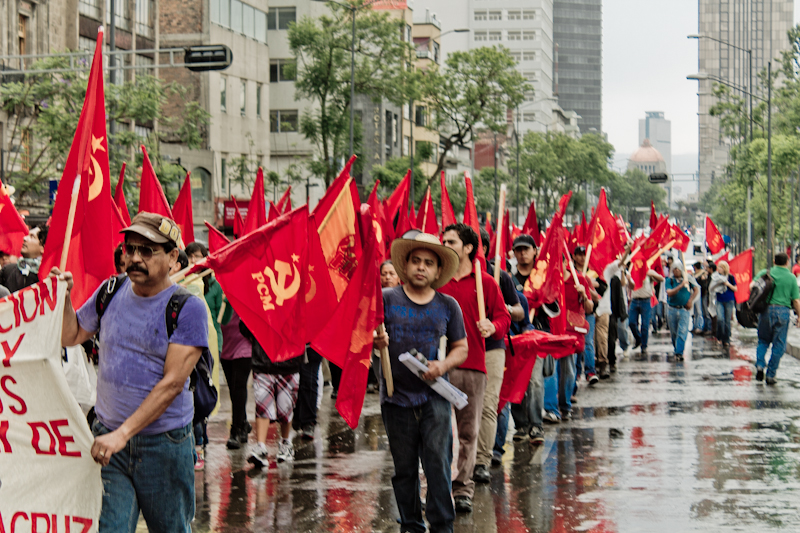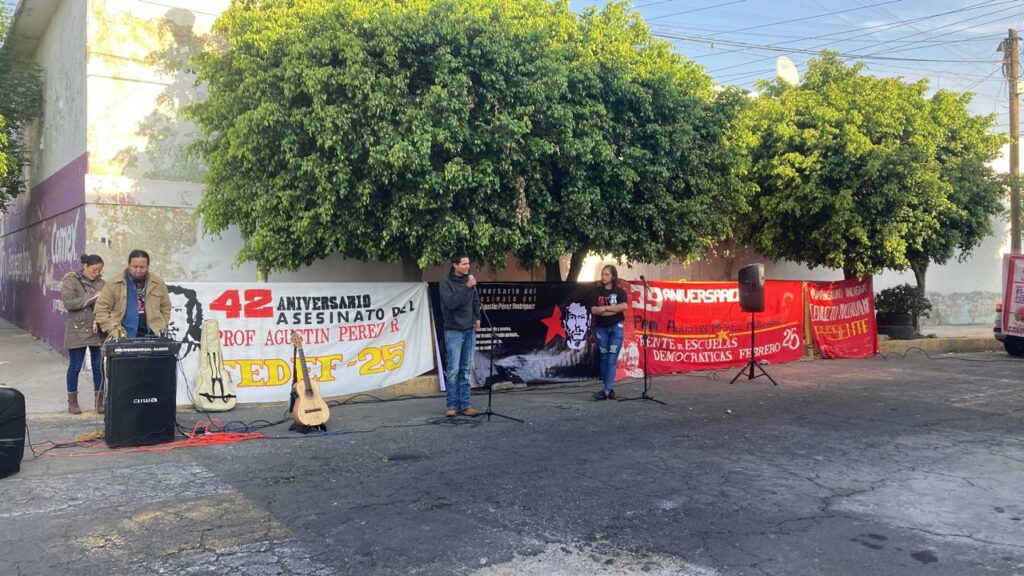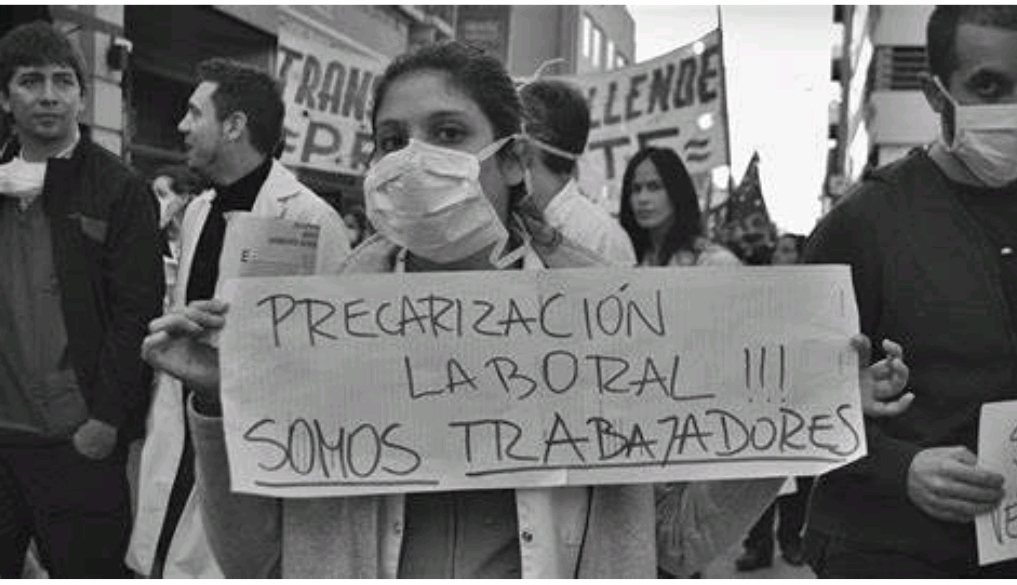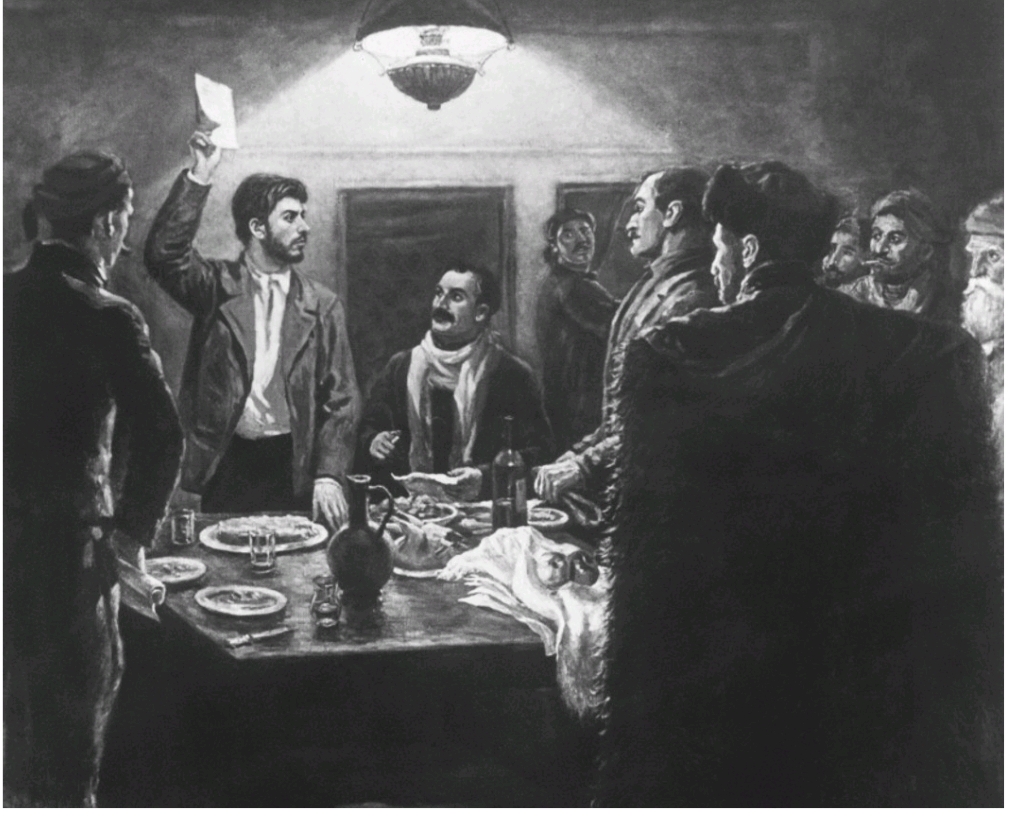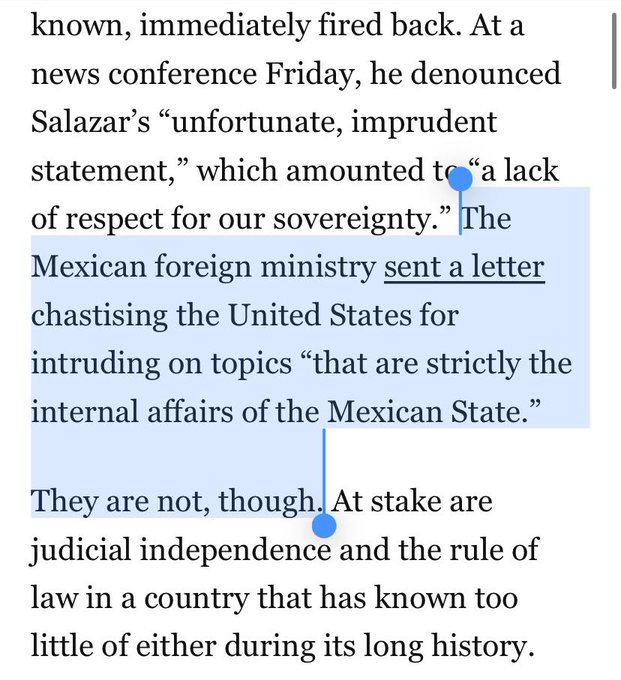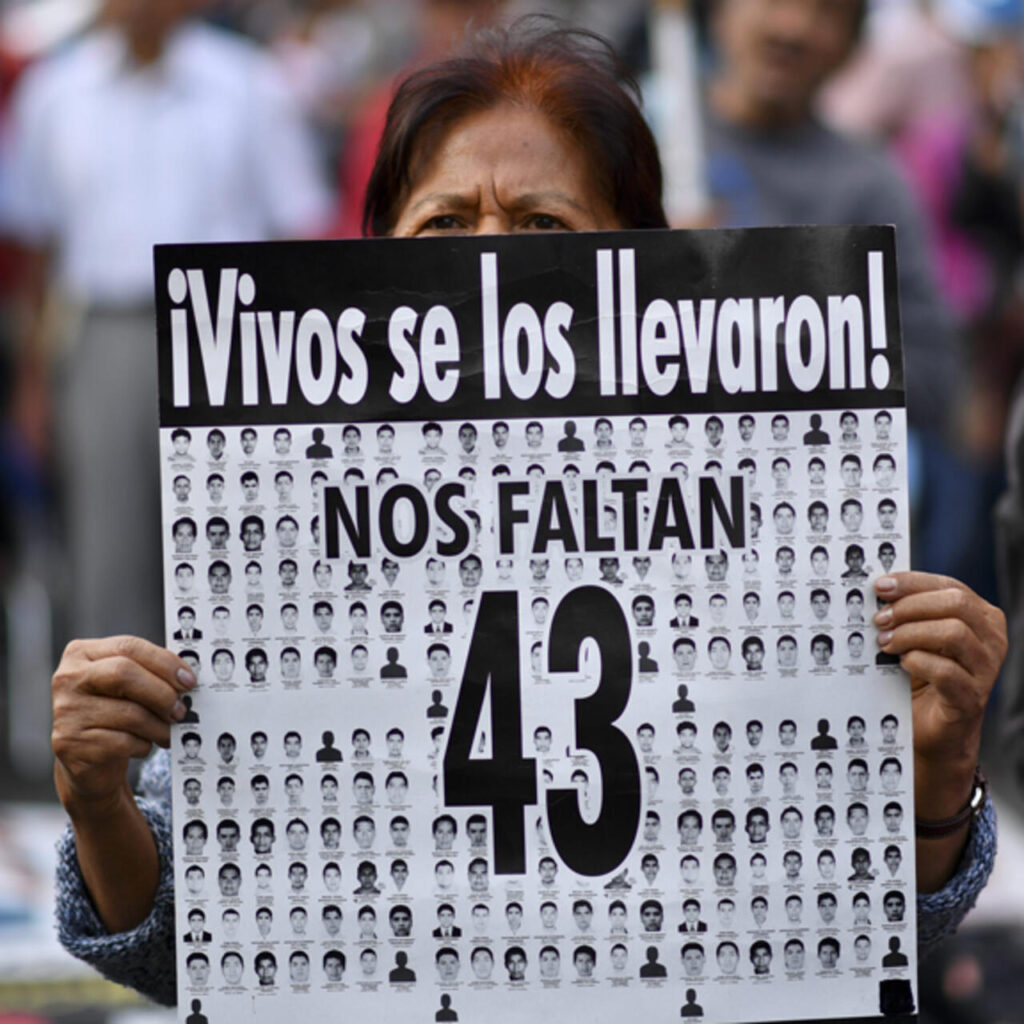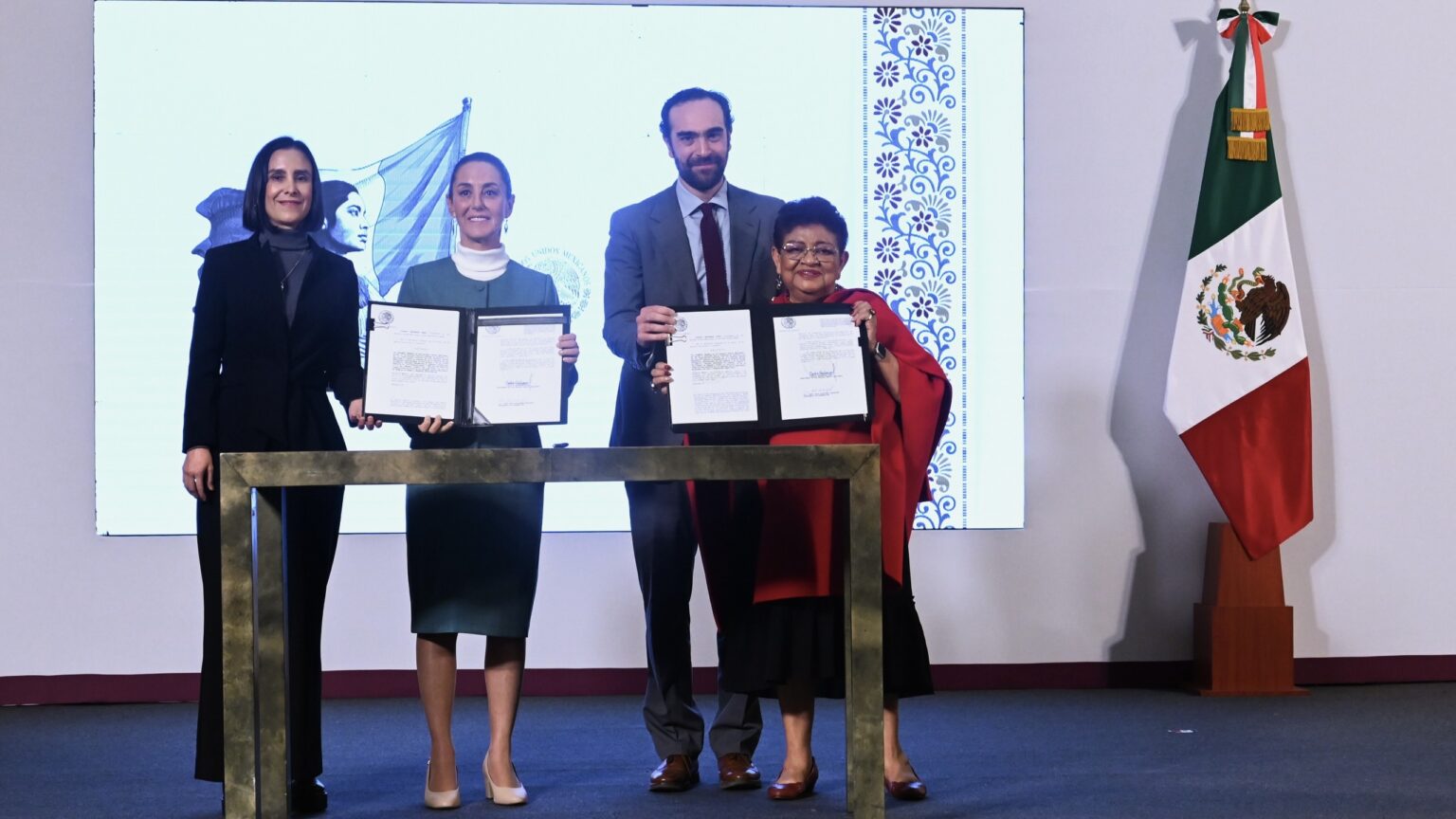With three weeks of presidential campaign, Sheinbaum’s voting intention grew to 58%, four percent more than in December
March 22, 2024 by Eder Suárez

Claudia Sheinbaum, Mexican presidential candidate.
Only three weeks after the start of the presidential campaign, a survey by Mexican newspaper Reforma shows that Claudia Sheinbaum, the candidate for MORENA’s “Together we will make history” coalition, has increased her lead over the other two candidates, now with 58% in voting intentions, that is, 24 percentage points above her closest rival, Xóchitl Gálvez, of the “Goes for Mexico” alliance.
Sheinbaum skyrockets in the polls
This is the third opinion poll carried out by the newspaper and one can see the clear increase in favor of the MORENA candidate: first scoring 53% in August, then 54% in December last year, during the period of internal elections in her party and pre-campaign. Now, three months later and with three weeks of campaigning, her electoral preference has grown by 4 more percentage points.
The second in electoral preference, Xóchitl Gálvez, has also had changes in voter intention. In August 2024 she started with 33%, only 20 points below Sheinbaum, but by December she dropped to 29%, and has now rebounded to 34% for this month, that is, one point above where she started her race.
The variations of the opposition candidate have a possible explanation in the changes of candidate by the Movimiento Ciudadano party, Jorge Álvarez Máynez, who went from 14 to 17% in the first polls (when Samuel García, governor of Nuevo León, was the candidate) to only 8% in the most recent one. However, it is noted that the 9 points lost by the orange party did not go to the opposition candidate, but were distributed widening Sheinbaum’s advantage and allowing Gálvez to return to the preference she had at the beginning of her unveiling.
Gálvez asks for illegal support to her campaign
In view of this unfavorable panorama for the proposal represented by the PRI-PAN-PRD, candidate Xóchitl Gálvez has avoided talking about her performance in the polls. Recently, during an event called “Dialogues for Democracy”, organized by the Employers Confederation of the Mexican Republic (COPARMEX), the former PAN senator limited herself to say that the poll does not keep her awake at night, besides affirming that it does not represent the reality in terms of voting intentions.
However, during the same event, and contrary to the electoral laws, Galvez asked the businessmen gathered there to “fight, to get their act together” in favor of her campaign and even urged them to take two and a half months off from their companies so that “they can convince their employees, the people of the community” to vote for her.
This call to influence from the business sphere is prohibited according to Articles 159, 414 and 447 of the General Law of Institutions and Electoral Procedures, reason why José Medina Mora, president of said confederation, has already rejected Gálvez’s exhortation since his organization is “highly political, but totally non-partisan” and that they can only “promote that citizens go to vote”.
Citizen perception
Among the other data provided by the survey is that 65% believe that Claudia Sheinbaum will win the election on June 2. On the contrary, only 15% consider it possible that Xóchitl Gálvez will win the election, a percentage far below her declared voting intention. 36% of those polled stated that they have not yet decided their vote yet.
Within the survey, the other candidate, Jorge Álvarez Máynez of the Movimiento Ciudadano party, registers a voting intention of 8% and a perception of 2% about his possibility of winning.
Along with these results, another one that calls attention is that before the question “What is more likely in the presidential election?”, 61% responded that the MORENA candidate will surpass the votes obtained by López Obrador in 2018, who won the Presidency of Mexico with more than 30 million, which represented 53% of the votes cast.
This perception maintains a correlation with the current approval of López Obrador, who only six months after leaving office maintains a historic popular approval for a Head of State with 73%. This represents an increase of 11% compared to the December survey.
https://peoplesdispatch.org/2024/03/22/ ... ls-widens/
******
Communist Party of Mexico
Communist Electoral Platform #EligeLuchar
Communist Party of Mexico 04 March 2024 Visits: 1404
COMMUNIST PLATFORM
FEDERAL ELECTIONS 2024
*
A New Power
Who and how should the country be governed?
Or Workers Power or Monopolies Power
Regardless of the cosmetic nuances, the trivialities, the styles, administrations, colors, names and surnames, the power of the monopolies governs six years after six years, president after president. In each government the situation of the working class worsens with respect to the enormous wealth and development that it produces for others; and not because the president or government in power is worse than the previous one but because it is the system itself that is worse. It is the system that neither Morena nor the PRIAN question, on the contrary, it is the one they preserve, the one they retouch, the one they defend. Only the Communist Party proposes that the working class take the destinies of this country in its hands, the country that it builds daily but that it builds for others. We communists propose that the power and economy of our country should be in the hands of those who work in it . We call to return Mexico to a country for workers.
Today, in this campaign, we illustrate to the opinion of our class brothers, to the rest of our people, what we mean by a New Power and a New Economy. We address the great national problems head-on, speaking without lies, without false dilemmas, without false illusions; We point out the urgent and necessary solution to barbarism, to tragedy, to collapse, to disaster. Before, during and after the campaign we will persist in grouping our class under this key; Therefore we will see each other again in every factory, in every school, neighborhood or town. The struggle requires a General Staff, we do not run only as communist candidates for the presidency, for the governorships; We present ourselves and we will remain the unyielding head of the left-wing opposition, as tribunes of the people.
Legislative power
The current system of parliamentary representation is corrupt in its essence, legislators do not represent the will of the voters of the working class and the popular sectors, but rather their own interests and those of their financiers: businessmen, drug traffickers, bankers, etc. Through this mechanism, when a legislator approves a measure against the people, there is no option in the current system beyond waiting 3 or 6 years and voting for someone else. But when all legislators offer the same thing and change from one Party to another, like changing clothes, there is no way to influence legislation with such a mechanism. For legislators to not be a group of millionaire courtiers, but truly popular representatives, the political system requires a radical change.
Therefore, we communists propose:
Drastic reduction in the salaries of deputies. They will earn what a specialized worker earns, so the increase in their income can only come from the increase in the income of the entire working class.
Revocation of mandate of any legislator by his voters and at any time.
Disappearance of the current bicameral system of Senate and Congress, fusion of the legislative and executive powers in a single National Assembly.
Elections not only by territorial demarcation but also by workplace, to guarantee that those who work rule. Elimination of multi-member deputies.
The major constitutional reforms must be presented and discussed in assemblies by workplace and among the working people, in the various territories. The deputies will be obliged to comply with the resolutions issued by the majority constituted in their respective assemblies.
Call for a New Constituent Assembly to prepare and approve a new Constitution based on social ownership over the means of production and Workers' Power.
Executive power
For decades the bourgeoisie in Mexico has engendered and maintained a deformed version of the Republic, where the presidential figure is practically that of a six-year monarch – and sometimes beyond his own period. The President is the great legislator, the extrajudicial executor, the finger that names his successor. The democratic task of eliminating this monstrosity was not assumed decisively by the bourgeoisie and became one of its mediating elements. With assassinations, all types of fraud, sabotage and terror, the bourgeoisie decides which of its political-business groups will place its representative and, therefore, will take the lion's share in the administration of the wealth of this G20 member country. Once the replacement has been resolved and the rivalry has been limited, the presidential figure fundamentally serves the interests of the bourgeoisie.
The military apparatus is subordinated, through this leadership, to the interests of the imperialist bloc of which the domestic bourgeoisie is a part; without any effect on the sources that give rise to crime, on the contrary, the military scoundrel of the high command is mired in scandalous corruption while the statistics of those killed by crime rise through the air to an official figure of 350,000 dead and 72,000 missing . The army takes to the streets and against the people as a recurring bloodthirsty resource, as witnessed by the massacre of Tlatelolco, Corpus Thursday in 1971, the Dirty War, the massacres of Acteal, Aguas Blancas and El Charco or the disappearance of the 43 normalistas of Ayotzinapa in 2014. It is alarming that already in the period from 2007 to 2021 the military usurped 127 originally civilian functions, and from 2021 to 2024 the figure reached 246 functions. In that same period, its budget went from 0.6% of the GDP to devouring 2.22% of the total, and a rearmament was carried out that had not been seen in terms of economics and volume since the Porfiriato. All this without any external conflict being confirmed in the same period of time, which suggests a preparation to subjugate the people.
Therefore, we propose:
Dissolution of the figure of the president and his replacement by a Council of Ministers, appointed by and subordinate to the National Assembly.
Elimination of the figures of municipal president/mayor, trustee and councilors in the administration of the city council. Replacement by a Local Council that will administer the municipal government.
Severe punishment for former presidents and army commanders responsible for state crimes.
Dissolution of the Army, the National Guard and other state and parastatal repressive bodies. And its replacement with a popular militia focused in its doctrine and operation on the defense of territorial integrity, the deterrence of imperialist aggression against the peoples of the world, etc. The popular militia will not be able to repress the majority of the population for having members of such a majority integrated into its tasks, for having their rifles pointed at the exploiters and their accomplices. The popular militia will not squander resources on the extravagant expenses of the current military scoundrel, nor on internal repression or on a prolonged war of mere façade against drug trafficking, but will use them efficiently to increase the defensive capabilities of the Workers' Republic. .
Real and universal military training of the population.
The work of surveillance and suppression of the enemies of the people will be done in combination with community surveillance bodies, in charge of safeguarding the populations from which they emanate.
Foreign policy of friendship with all the peoples of the world; opposition to blockades, sanctions, imperialist aggression, etc.
Cancellation of anti-immigrant policy; solidarity with migrant workers in their path. Granting full citizenship rights to all migrants in Mexico who contribute with their work to social production.
Power of attorney
The legal system of our country, as an expression of the crystallized will of the possessing class, is absolutely focused on preserving and regulating private property, as well as its acquisition, purchase, sale, transfer, succession, etc. The high courts are filled by members of oligarchic families, with stipends that are an affront to the working population. Like NAFTA before, now the USMCA becomes the supreme law and reforms the rest of the legal apparatus under its demands. The judiciary functions as a parapet for the power of the monopolies: due to formalities it leaves the major embezzlers of the public treasury unpunished; as well as impunity for those responsible for massacres and state crimes; It restricts, violates and criminalizes the people's forms of struggle; sanctions dispossession as valid, labor and agrarian trials languish bureaucratically for years; Trials against members of indigenous nationalities are an offense by not recognizing the language of the defendant; and only when the crimes affect members of the bourgeoisie does the supposed expeditious nature of the administration of justice become a reality; Meanwhile, crimes against working women and young students from popular sectors, or against proletarians on the street, on public transportation or in their homes, surely remain unpunished. The discredit, distrust and rejection of such power is not surprising. For the law and the courts to be at the service of the people, and enjoy their confidence, they must emanate from a New Power.
Therefore, we propose:
The elected nature of the Courts as organs of the National Assembly.
Public nature of all trials to allow popular scrutiny.
The core of the New Law must be the safeguard, as a crystallized will of the working class, of the social property of the socialized means of production, of its inviolable character, as well as the elimination of the economic basis of all political power of the classes. exploitative.
Search for the truth and reparation for damage caused by state crimes. Prioritize the search for material truth rather than formal truth.
Establishment of an urgent plan for the search and rescue of the missing.
Possibility of appealing a higher court ruling if it is believed to be unjust, and without the exorbitant cost of today's protection.
Ensure the right to be tried in the mother tongue and/or with an interpreter of the accused, something currently non-existent for the 15% of the population that speaks indigenous languages.
Create a Professional Career Service for defense attorneys, with adequate salaries, to ensure the right of all workers to have a free, quality public defender.
Transformation of prisons into compulsory labor colonies. Prisons must stop being the current centers of barbarism, training and expression of criminal power, and become colonies of social reintegration. Work and collective discipline must be a central point of this reintegration.
Corruption will be considered a general attack against the people, since it would significantly harm the achievements of the National Development Plan; A severe punishment must be proportional to the dimension of such an attack against the population.
Drug trafficking
Drug trafficking is a criminal business that has grown rapidly in our country in the last 30 years. It has become inextricably intertwined with businessmen, the military and the parties of the bourgeoisie. This illegal industry resorts to violence, weapons and corruption to ensure its operations. It subjugates thousands of farmers to grow drugs and has an army of sellers, hawks and hitmen to ensure its distribution. This business is mainly export; It supplies the United States, the main drug market in the world. The secret of drug trafficking is not in its strength, but in money. It is the billions of dollars generated by the export and sale of drugs that ensure their availability to weapons, people and political support. The military power of drug trafficking cannot be reduced and abolished without first ending its economic power.
To face this serious problem, we propose:
Expropriation of banks to form a state banking system. This would nip the possibilities of money laundering in the bud.
Centralization of foreign trade and exit from the Mexico-United States-Canada Treaty (TMEC). This would significantly limit the export capacity of drug trafficking.
Expulsion from Mexico of the United States police and intelligence agencies, which currently operate in the country, since their links with drug cartels are historically documented.
Frontal combat against drug trafficking using both the massive popular militia, the intelligence gathered by popular informants, and its combination with measures that extirpate all good and wealth from these groups through the Popular Courts. Particularly fierce combat against those that directly affect the population: human trafficking, addictions, forced disappearance and kidnapping, robberies, child pornography, etc.
Policy of ideological combat against drug consumption from a public health perspective, prioritizing early rehabilitation, and not criminalization of consumers.
Indigenous villages
Indigenous peoples have suffered several centuries of oppression. Neither the victors of the War of Independence, nor those of the Reform or the Mexican Revolution have granted recognition to these peoples as full nationalities. This national subjugation adds to the exploitation that indigenous workers and peasants already suffer. The emergence of the Zapatista National Liberation Army (EZLN) in 1994 marked a before and after of the indigenous struggle for their liberation. However, from that moment to date, the different governments have betrayed all efforts to achieve political recognition of the indigenous peoples, the main example being the betrayal of the San Andrés Larráinzar agreements, and the current military, paramilitary harassment and drug trafficking against indigenous territories.
Therefore, we propose:
Recognition of the San Andrés Larráinzar agreements and respect for the autonomy decisions of indigenous peoples.
Full right of indigenous peoples to self-determination as nationalities, to decide their forms of political and territorial organization, public administration and language.
The ownership of natural resources, such as water, forests, soil and subsoil in the territory of indigenous peoples, originally resides in each of them.
A New Economy
Who owns the wealth?
National Development Plan
The production of wealth in Mexico is fundamentally oriented towards increasing the profits of the large monopolies; it is based on the bloody exploitation of the working class; and the current government management is no exception to this rule. Statistics show that salaries in Mexico are one of the lowest on the planet and the smallest among the OECD economies, even with the notable increase in the national minimum wage. There is no correspondence between salary growth and the economic growth of the country, which has surpassed countries such as Australia, South Korea or Spain in terms of GDP, and generated some of the richest tycoons in the world such as Carlos Slim. The accelerated increase in the wealth of the wealthiest and the misery of the workers are not a failure of the system; It is the result of its very essence, it is its success in relation to its interests and characteristics. Let us also add that the production of wealth in capitalist society is carried out in an anarchic, chaotic manner, leading us to crises and cataclysms, to the destruction of the foundations of wealth itself, which are nature and work force. In the particular case of our country, an important element of the formation of such monopolies was the privatization of state companies built on the basis of extracting the effort of the entire Mexican society; and at this point none of the bourgeois parties, not even those that call themselves anti-neoliberal, have proposed reversing those decisions.
Therefore, we communists propose:
Requisition, expropriation, nationalization and socialization of the 1,100 companies previously privatized and handed over to monopolies. These will become the core of the social sector that will produce in accordance with a National Development Plan.
Expropriation of all companies that have or have had links to drug trafficking and money laundering.
Incorporation into the social sector of other centralized, concentrated, strategic companies, etc., as required by the National Development Plan and as the National Assembly orders and executes it.
The fundamental objectives of the National Development Plan are to progressively accumulate greater productive capacities for the growing satisfaction of the material and cultural needs of the workers in the country; as well as ensuring an ecological balance with the environment. As well as implementing technological developments under the control of society, to overcome the narrow frameworks of production focused on profits.
The National Development Plan must ensure the reduction of the working day to 35 hours and the elimination of unemployment, taking advantage of the automation of mechanical, risky or alienating tasks. The purpose is to take advantage of all the capabilities installed in the country, but without the shackles imposed by the USMCA and other imperialist treaties.
Promotion of the nuclear industry for the generation of electrical energy; since it is scientifically proven that it would reduce the environmental impact compared to other sources, such as thermoelectric or hydroelectric.
Prohibition of planned obsolescence, which generates higher costs for consumers and large amounts of waste.
No worker should be thrown onto the street. When a job becomes unnecessary, the New Economy should consider training you for another job as your new salaried job.
Promote and support the transition of small businesses, small producers, self-employed workers, artisans, etc., to cooperatives. Favoring those who advance in such a process with inputs from the social sector and at preferential prices.
Health
The health system is in a state of abandonment. The IMSS, the ISSSTE and the other social security institutes have been dismantled and embezzled in the last 30 years, which has resulted in their current inefficiency and saturation. Privatization, lack of investment and corruption have eroded the capacities of these institutes. They are saturated, getting a medical consultation, studies or an operation can take several months of waiting. Six-yearly occurrences, such as Seguro Popular or IMSS-Wellbeing, which supposedly sought the universalization of health, did not achieve their objective and instead created a financial and logistical crisis in the health sector. The shortage of medicines and vaccines is proof of this. Meanwhile, pharmacy clinics have sprung up throughout the country, reaching more than 18 thousand, and alleviating the ailments, but without providing follow-up and continuity to the most serious ones. The sad losses of the COVID-19 pandemic showed the fragility of the health system in Mexico.
We communists believe that workers should have guaranteed access to a free, efficient and quality health system. But this is not possible as long as health is a business.
Therefore, we propose:
The absorption or incorporation of all private practices, owned by large pharmacy chains, to the first level of care of the public health system. The number of these offices is 12 times larger than the current IMSS Family Medicine Units. This expansion would allow the current health services to be decongested and reach the majority of the inhabitants of the working-class neighborhoods and towns.
The incorporation of hospitals and large private clinics into the public health system. This would imply a proportional increase to the 70% of beds currently available at the IMSS, which would quickly improve care capacity.
Expropriation of the large pharmaceutical industry to ensure the supply of medicines and vaccines.
Basification of all hospital staff, salary increase and improvement of working conditions for health workers; which, together with less hospital saturation, would improve the quality and efficiency of care.
Reproductive and sexual health, including the interruption of pregnancy, will be free, safe and free, ensuring psychological support.
Prioritize preventive medicine, particularly in the face of chronic-degenerative diseases, to save costs and avoid health complications. Ensure health care and education, particularly mental health, in educational and workplace centers.
Labor protection, pensions and social security
The same situation that permeates Health-Business, as the antithesis of Health-Law, exists in the other aspects of Social Security. The pension situation is especially dramatic. This right has been pulverized both by postponing the retirement age, turning workers into a workhorse of capitalism to the grave, and by converting social funds into funds managed by private financial groups. Our pension funds, risked in the stock market lottery, are transformed from a right to a source of capital for the exploitation of our own class. The elimination of daycare centers and other elements that socialized domestic work are a setback in the rights and advances of proletarian women. On the basis of social production and the accumulation of capabilities of the New Economy, an increasingly broad and multifaceted Social Security System will be financed.
Therefore, we propose:
Recovery of a Central Social Security Fund, financed both with workers' contributions and with the wealth contributed by the Social Sector, and which will tend to grow. The management of the Central Social Security Fund will be one of the issues that the National Development Plan must regulate.
Return to the retirement system and general reduction of the minimum retirement age to 60 years. This age may be lower in the case of jobs with a greater effect on health, such as mining, masonry, handling of chemical products, etc. Retirees will have the opportunity to continue working voluntarily with reduced hours and mainly in training tasks and transmission of their work experience; Their pensions will be free of encumbrances. Retirees will have social institutions for specialized care.
Organization and construction of daycare centers by work center, with dining services and comprehensive care (medical, dental, psychological, etc.)
Transfer the functions that currently make up domestic work to social industries; provide food and care for all members of proletarian families through canteens, washing industries, cleaning, home maintenance, etc., accessible to workers through a percentage of their salaries.
Heavy work, overtime and night shifts are prohibited for minors.
Inspections of working conditions, safety and hygiene carried out by councils elected by the workers.
Participation of the work assembly in hiring and dismissals.
Expropriation, socialization and/or construction of new spas, rest centers, rehabilitation, etc., to guarantee that well-deserved rest is a right and a reality for the producers of wealth and not a privilege of social parasites.
living place
Getting your own home today is an almost impossible dream to achieve for our class. Real estate speculation increases prices and pushes workers to live in the periphery. Mortgage credit has become a lifelong debt that bleeds the salaries of those who manage to obtain it. Builders are increasingly making smaller, less safe and more remote homes. The lack of coordination for the establishment of housing and work centers pushes workers to the periphery of cities and forces them to spend several hours a day on public transportation. Banks, real estate companies, construction companies and tenants get rich from the lack of decent housing for the working class. We communists think that the State must ensure that all working families enjoy decent housing. This cannot be achieved while the construction and acquisition of housing remains a business.
Therefore, we propose:
Control of land and real estate prices. This will depend on technical factors, such as its characteristics, position or equipment, and not on the fluctuations of the market.
Elimination of property tax for those who have 1 property. Strongly progressive tax on those who have more than 3 properties. This measure, together with the previous one, would root out real estate speculation.
Expropriation of the construction industry.
Expropriation and/or regularization of land ownership to guarantee housing as part of the popular heritage.
Replacing mortgage loans with state loans. The State will provide loans to workers to buy, build or remodel their home without charging interest, beyond inflation.
Establish a five-year plan for state and cooperative housing construction that responds to the needs of the population. These homes must ensure a decent space, not like the current “social interest” housing projects.
Homes built by the State must implement measures to care for the environment, such as the use of solar panels and heaters, rainwater collection, etc. In addition, it must contemplate the construction of social integration elements such as parks, sports spaces, among others.
Education
The idea of education in Mexico is sold as a mechanism for social mobility, but in practice it works as a workforce training machine in accordance with market needs. Study plans and programs are a field of ideological dispute between the different visions of the bourgeoisie, while pressure from the bourgeoisie as a whole increases to eliminate scientific and critical criteria due to educational obscurantism. These issues are decided bureaucratically, leaving the teaching profession relegated. The schools are saturated with groups that exceed 50 students, in many places the students do not have minimum conditions to study, they arrive without breakfast or lunch. This means that schools cannot adequately meet the educational needs of children and adolescents. Faced with this, duckling private schools proliferate that do not have infrastructure or pedagogy, but are enriched in part by saturation and selection criteria in the public educational system. At a higher level, universities and public institutions face a financial and corruption crisis. They increase tuition and administrative costs that make it difficult for the children of the working and peasant classes to study at that level. We communists think that the educational system should contribute to the formation of the new man and woman, the integral development of people, from a scientific and critical point of view, as well as the elevation of technical, human, cultural and scientific capabilities. of the population.
Therefore, we propose:
Ensure food, transportation, school supplies and clothing for all students at basic levels.
Creation of Student Houses for the accommodation of foreign students of higher level, with dining rooms and insured transportation.
Support the democratization of Universities and Higher Education Institutes, which must be carried out autonomously by their community.
Ensure free public education at all levels and up to postgraduate education.
Socialization of the field of private education; train and integrate its staff into the organized teaching profession with full rights, which would immediately guarantee access to education for nearly three million more students and the relative relief of saturated classrooms.
Basicization of subject workers with more than one course in two successive periods, both at basic, upper secondary and higher levels.
Development of new study plans and programs at all educational levels from a scientific and critical perspective, where teachers must play a central role; and where the inclinations and capacities of each individual must be encouraged, cultivated and used for society through early guidance. These plans must include artistic, sports and productive training.
Eliminate the figure of “hourly contract” in a new Federal Labor Law for academic workers of Universities and Institutions of Higher or Higher Education that are dedicated exclusively to teaching, who must be hired without exception for full-time or half-time .
Higher level students must provide professional services in activities substantially related to their studies, in the productive sector or the government. This will be considered a temporary job and they will receive a salary for it.
Recovery and expansion of the educational project of rural normal schools throughout the country. Reopening of all closed rural normal schools. Ensure food, housing, art, culture, recreation and science on each campus.
Science
In Mexico, science is completely forgotten and relegated. There are many women and men dedicated to science and highly trained, but there are not enough positions for them to carry out Research and Development. The current stimulus system favors serial publication, without worrying about the impact. Scientific research in the private sector is focused on increasing profits and reducing costs. The usefulness of scientific potential to address serious problems in society and the environment is completely ignored. None of the last three presidents has complied with the decree to allocate 1% of GDP in science and increase it progressively. The AMLO government reduced the already scarce investment in science to transfer resources to pharaonic works, the army and clientelistic programs. Science must be mandated to contribute to satisfying the needs of the people and solving major problems, but only scientists themselves could decide how to achieve this. We communists think that scientists, researchers, engineers, technicians, etc., can better develop their creative potential under another way of producing and organizing society. However, for this to be the case, it is necessary for science to stop being a business and take on a central role in the country's productive forces. Therefore, we propose:
Increase in the budget in Science and Technology, from the current very poor 0.41% to 3.0%
Disappearance of the current CONAHCYT and creation of an Academy of Sciences and Technology that brings together all the scientists and researchers in the country. This organization will direct the scientific development of the country, linking its objectives to those of the National Development Plan.
Transform the SIN, moving from an economic stimulus to a salary income that ensures job stability for researchers.
The National Academy of Sciences and Technology will provide consulting to all public companies and cooperatives in society; will guide, train and guide proletarians, employees, peasants, workers, etc., who propose technical innovation in their production area; It will seek to generalize inventions, technical improvements, the development of new productive forces, etc.
The National Academy of Sciences and Technology will be in charge of elevating, among others, the energy industry, implementing the country's great capabilities in the use of renewable energy (wind, hydraulic and solar) as well as nuclear and geothermal energy. In addition, research must be done for energy efficiency and the reduction of the use of fossil fuels.
Research must be done on how to apply new technologies, such as Big Data, the Internet of Things, quantum computing or Artificial Intelligence, to improve the technical and operational aspects of the National Development Plan.
Land and food
Economic policy in Mexico, subordinated to imperialist treaties, has condemned the Mexican countryside to its non-viability, its destruction, its aging and even the depopulation of rural settlements. The extension of crops and the volume of production of basic foods has been significantly reduced, they are no longer able to cover some necessary products; In turn, the extensive production of some export products is carried out in an unsustainable manner, with the only beneficiaries being a layer of large capitalists, middlemen, coyotes , etc. The average peasant is ruined, even though he has land, the market crushes him through the double pressure of the excessive costs of his inputs and the insufficient prices of his crops. The ruin of the countryside is becoming the ruin of the city, where all workers find increasingly critical and unsustainable conditions. In Mexico, the imperialist political economy is preparing a famine for us, which if it occurs will be extremely painful and difficult to overcome given that the continuity of the human factor with knowledge and skill in this regard is even lost.
Therefore, we propose:
Safeguard the collective nature of land ownership, which preserves its ejidal or communal character, complementing it with the promotion and financial and technical support for collective production through cooperatives that attend to the specific agrarian vocation of each nucleus.
Socialization of large agroindustrial companies, incorporating them directly into the National Development Plan.
Promotion and support for the formation of cooperative and mixed agro-industrial companies in agricultural centers.
Policy for a more harmonious redistribution of the population through material and economic incentives. Society requires and will require food, the countryside requires workers, and workers require medical, educational, cultural services, etc. The countryside, under the New Economy, can even offer more comfortable housing conditions, pace of life, etc., than the city itself.
Formation of warehouses that make machinery, supplies, seeds, breeding stock, tools, etc. accessible in an accessible manner. The problem of contamination from fertilizers such as glyphosate is not solved by the artisanal production of biofertilizers by producers, but by establishing a state industry that produces them massively.
The National Academy of Sciences and Technology will have as one of its orientations to return cooperative farmers and farm workers to the collective owners of land and technology. Materials science, nanotechnology, drones, automation, biotechnology, artificial intelligence, etc., must become mechanisms to allow a more comfortable life for farm workers and full food security for the country.
Water
Water management has become one of the great national problems and a stark facet of the class struggle. Capitalist irrationality is the root cause of climate change; of the disproportionate concentration of the population in a few cities; the use of most rivers as waste channels for mining, industry, real estate, etc.; of the widespread disinvestment in public drinking water networks to redirect that wealth to the needs of capital and encourage its privatization; of the hoarding of concessions and water volume quotas by the large combined companies. In such a way that in cities like Monterrey, Guadalajara, etc., the entire population of the city is deprived of the vital liquid, descending into an inhuman situation, while companies such as breweries, wineries or the so-called hospitality industry do not They do not flinch, they do not paralyze and they use 100 times more water than is required by millions of inhabitants.
Therefore, we propose:
Preserve in an unrestricted manner the public and social nature of water, as well as its control by the Workers' Power. Suppress any commercial form thereof, expropriating bottling companies, pipe companies, etc.
Local water management must be supported by organizational forms that encourage active community participation, such as drinking water committees or assemblies.
The National Development Plan must take into account factors such as climate change, water stress, drought, etc., and therefore increase the efficiency of production processes that use water resources in each branch; dedicate environmental engineering efforts to recover forests, runoff areas, etc.; carry out urban reengineering works to incorporate the use of rainwater, the same in the state housing industry.
The National Academy of Sciences and Technology will study and implement the use of water sources such as desalination, condensation of ambient humidity, etc.
local governments
What do the communists who run for local and municipal elections propose?
Since radical transformations require resolving the main question of the revolution, namely, the question of power – In the hands of what social class is it? – it is natural that where the program is best expressed is in the field of elections. federal. The communists who run for local elections, supported by the grouping of social forces that express the anti-capitalist, anti-monopoly and anti-imperialist front, must answer what conception guides them to compete to occupy those positions.
First of all, the campaign itself must be used to reflect the national program in local priorities, since it must be grouped in that key. Communists conceive the occupation of such local government positions not as the panacea or the root solution to the great problems that require a revolutionary transformation; but as centers or trenches of resistance or offensive against the power of the monopolies, as they continue to accumulate the forces of the Party and such alliance.
For the communists, each locality, colony, municipality and state where they head the administration represents a position that must be defended against the existing social order until the revolution is achieved in Mexico. To defend this position we can only trust in the organization of the workers. For the communists the main objective of local administration is essentially to open channels for the participation of the people in the administration, as they increasingly understand their organized stance. Workers who can access more opportunities and platforms will be more conscious of protecting this position against the capitalist social order. Wherever the communists obtain a position, the people will have a voice in local administrations through channels such as representations of neighborhoods, districts, schools and workplaces, thus the formation of Workers' and Popular Councils.
The communists aspire to the well-being and prosperity of the popular sectors in local administrations. Local governments in this social order focus on the accumulation of profits. The communists will begin by dispersing the mafias that surround local governments around profit. No employer or contractor will be able to use local governments led by communists for their advantages and interests. The only objective is to increase the standard of living of workers. All activities of local governments will be planned according to the needs of the people. Even if it were a penny that is administered, that penny must be subject to the principles of planning with popular participation, transparency and accountability to the people.
All available means will be used for workers' access to healthy and contemporary conditions of housing, transportation, education, culture and recreation. The main goal is to provide workers with healthy and safe housing conditions, educational facilities, safe public transportation and opportunities for recreational activities and vacations. Only with the struggle of the communists in local administrations can green areas be protected and improved against speculators.
The government of communists in local administrations means the development of a culture that strengthens collectivism and solidarity. One of the main tasks of communists in local administrations is to create environments where children, young people and adults can improve together. A wide network with easy access to libraries, science centers for children and young people, theaters for plays that we will write and perform together, choirs and orchestras where we will learn and sing our songs, lecture series that will explain how to use science for the benefit of workers , and collective sports activities will be the instruments of this culture of collective life.
The jobs of communists in local administrations will also be a barrier to the expansion of drug consumption. The communists will take measures to protect our youth against the corrupting attacks of this anti-worker social order, against drug use and any type of degeneration.
Facilities will be created for equality and freedom of women. One of the responsibilities of communist local administrations is to establish kindergartens in workplaces and neighborhoods; support women's participation in public life outside their residences and protect them against violence. The communists have a decisive importance in creating additional possibilities for the employment of women as workers with equal rights.
We will work to protect and promote health. The basic health problems of the people, the safety of drinking water and food, school health, sports health and the issues of recycling and waste can only be solved if the communists gain influence in local administrations.
The establishment of consumer and production cooperatives will positively catalyze the lives of workers. Only communists can stimulate producer cooperatives in accordance with the characteristics of consumption and related localities against the rise in prices driven by large commercial chains and free market relations.
Communist local governments will not be “corporations” that behave towards workers like an employer. There will be no contradiction between communist bosses and workers who work for local governments; workers will participate in decision-making processes in a position where they will fight for common goals in the name of the emancipation of humanity.
The communists must put an end to the mechanism of subcontracting and precariousness imposed on local administrations under the guise of service, which only seeks to fulfill the interests of the capitalists. The communists will reject the subcontracting mechanism imposed on local governments during the last decades; as well as they will put an end to all the implementations that have turned the works into a field of profitable exploitation for the benefit of large and small capitalists.
The communists will not allow racism, religious fundamentalism, sectarianism and other forms of inequality in local administrations. Communist governments will have no place for approaches that classify workers as second-class citizens because of their languages, ethnic roots, sex or beliefs. The communists will not allow the abuse of religion in local administrations, but will adopt a secular model of administration and organize brotherhood, peace and unity.
In local administrations a relationship will be established with the social idea based on freedom and equality. No matter in which city, district or town the communists take the initiative, they will always keep in mind that they are responsible to the entire country and all of humanity; that everything they do has meaning as part of the fight to illuminate the future of our country and the world; that their local decisions have an impact on the scale of the national and international struggle.
http://www.comunistas-mexicanos.org/ind ... ligeluchar
Google Translator
